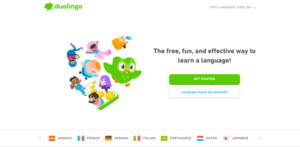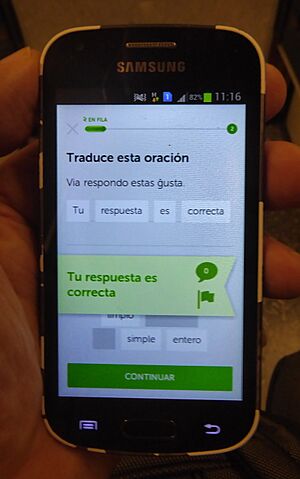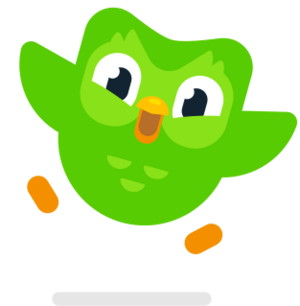Duolingo facts for kids
 |
|

Duolingo home page visited while logged out in March 2024
|
|
| Type of business | Public |
|---|---|
| Available in | |
| Traded as |
|
| Founded | 2011 |
| Headquarters | Pittsburgh, Pennsylvania, U.S. |
| Area served | Worldwide |
| Founder(s) |
|
| Key people | Luis von Ahn (CEO) Severin Hacker (CTO) |
| Industry | Online education |
| Products |
|
| Services | Language, music, chess, and math courses and language assessment. |
| Revenue | |
| Operating income | |
| Profit | |
| Total assets | |
| Total equity | |
| Employees | ≈ 830 (December 2024) |
| Advertising | Yes |
| Registration | Yes |
| Users | 130 million MAU (Q1 2025) |
| Launched | November 27, 2011 (private beta) June 19, 2012 (public release) |
| Current status | Online |
| Native client(s) on | Android, iOS, iPadOS |
Duolingo, Inc. is an American company that creates fun learning apps. It helps people learn new languages, and even music, math, and chess! Duolingo offers courses in 43 different languages. These include popular ones like English, French, and Spanish. You can also learn less common languages like Welsh or Irish. They even have made-up languages like Klingon!
The Duolingo app makes learning feel like a game. You earn points and rewards as you complete lessons. The lessons are short and interactive, helping you practice every day. Duolingo also has the Duolingo English Test, which is an online test to check your English skills. For younger kids, there's Duolingo ABC, an app to help them learn to read.
Duolingo is a "freemium" service. This means you can use some parts for free, but you'll see ads. If you pay for a subscription, you get rid of ads and unlock extra features.
Contents
Duolingo's Story
How Duolingo Started
The idea for Duolingo came about in 2009. It was created by Luis von Ahn, a professor, and his student Severin Hacker. Luis von Ahn wanted to make education more affordable. He saw how expensive it was for people in his home country, Guatemala, to learn English. Severin Hacker believed that "free education will really change the world." They wanted to make learning easy for everyone.
The Duolingo mascot is a green owl named Duo. Severin Hacker, one of the founders, actually dislikes the color green!
Growing and Getting Support
Duolingo started with some money from Luis von Ahn and a grant. They thought about being a non-profit, but decided it wouldn't last. So, they found other ways to make money. At first, they offered a translation service. Later, they added the Duolingo English Test, ads, and subscriptions.
In 2011, Duolingo got its first big investment. Famous people like actor Ashton Kutcher helped fund the company. Duolingo launched a private test version in November 2011. Over 100,000 people signed up to try it! The app became available to everyone in June 2012. By then, about 500,000 people were waiting to use it.
Duolingo kept growing quickly. In 2012, they got more funding. They released an iPhone app in November 2012 and an Android app in May 2013. By July 2013, Duolingo had 5 million users. It was the top free education app in the Google Play Store.
By 2015, Duolingo had over 100 million registered users worldwide. They continued to get more funding to help the company grow. By 2017, Duolingo had over 200 million registered users. They used the money to create new learning tools. In 2018, they reached over 300 million registered users. By 2019, Duolingo was valued at $1.5 billion. They had about 30 million active users each month. The company also opened new offices in cities like Seattle and New York.
New Features and Changes
In 2013, Duolingo started a program where volunteers could help create language courses. However, in 2021, they decided to stop this program. Now, professional language experts create and update the courses.
In August 2022, Duolingo changed how its app looked. The learning path became a straight line instead of a tree. This meant users had to follow a set order of lessons. Some users didn't like this change, but the company decided to keep it.
Duolingo also started using AI more. In 2023, they announced Duolingo Max, a new subscription level that uses AI for special features. In October 2023, they added math and music courses for iOS users. In January 2024, Duolingo reduced some contract workers. They planned to use AI for some of those tasks instead.
What Duolingo Offers
Learning Courses
Language Courses
Duolingo offers many language courses. These include popular ones like English, Spanish, French, Italian, Chinese (Mandarin), Japanese, Korean, Portuguese, and German. These courses follow international standards for language learning.
You can also find courses for speakers of English in languages like Arabic, Czech, Danish, Dutch, Greek, Hawaiian, Hebrew, Hindi, Irish, Klingon, Latin, Navajo, Norwegian, Polish, Russian, Swahili, Swedish, Turkish, Ukrainian, Vietnamese, Welsh, Yiddish, and Zulu. There are also courses for Chinese speakers (Cantonese), Arabic speakers (Swedish), and Spanish speakers (Catalan, Guarani, Russian, Swedish).
Subscriptions and Programs
Super Duolingo
Most of Duolingo's language features are free, but they show ads. If you want to remove ads, you can pay for a subscription called Super Duolingo. This paid version also gives you unlimited tries in lessons and access to some extra lesson types.
Duolingo Max
Duolingo Max is a special subscription that uses advanced AI. It has features like "Roleplay," where you can talk to an AI character. "Explain My Answer" helps you understand your mistakes. These features aim to make learning more like real conversations.
Duolingo for Schools
Duolingo for Schools helps teachers use Duolingo in their classrooms. Teachers can set up classes, give assignments, and see how students are doing. This helps them personalize learning for each student.
Duolingo English Test
The Duolingo English Test (DET) is an online test to check your English skills. It measures how well you can read, write, speak, and listen in English. The test changes its questions based on how well you are doing. This makes it a good way to see your English level. Many universities accept the DET.
Other Learning Programs
Duolingo has expanded beyond just languages.
- Duolingo Math is an app that teaches basic math skills. It was launched in August 2022.
- Duolingo Music was added to the main app in October 2023. It teaches basic music skills, like playing the piano and reading sheet music.
- Duolingo Chess lessons were introduced in April 2025. These lessons help you learn chess and play against a virtual coach. The difficulty changes as you get better.
- Duolingo ABC is a free app for young children. It helps them learn letters, sounds, and early reading skills. It has no ads or in-app purchases.
How Duolingo Helps You Learn
Exercises and Practice
Duolingo helps you learn by doing. You actively participate in the lessons. Lessons are short, so you can learn in small, easy steps. The app uses a game-like approach. Lessons include translating, interactive exercises, quizzes, and stories. Duolingo also uses a smart system that learns how you learn. It gives you personalized feedback and suggestions.
Making Learning a Game
Duolingo makes learning competitive and fun. You can join "leagues" with up to 30 other users. Your rank in a league depends on how many experience points you earn each week. There are different leagues, from Bronze to Diamond. You can also earn "badges" for completing special goals. You can even create your own avatar!
A "daily streak" is how many days in a row you've completed a lesson. The app shows a fire symbol for your streak. Duolingo also has "Friend Streaks" where you and your friends can keep your streaks going together. Streaks encourage you to practice every day and build a learning habit.
Duolingo Score
The Duolingo Score estimates how good you are at the language you're learning. It gives you a detailed idea of what you've learned. For example, if your score is 0-9, you can use simple words. If it's 130-160, you can understand almost everything and express complex ideas. The Duolingo English Test uses a similar scoring system.
| Duolingo Score | CEFR level | Student can... |
|---|---|---|
| 0–9 | very early A1 | use simple words and phrases in some common situations |
| 10–19 | early A1 | talk about themselves and where they live and ask and answer simple questions |
| 20–29 | high A1 | discuss their daily routine, order food at a restaurant, and chat a little |
| 30–59 | A2 | have basic conversations about familiar topics, including weather, shopping, hobbies, and holiday plans |
| 60–79 | early B1 | handle common situations while traveling, ask for directions, and make reservations |
| 80–99 | high B1 | share their opinion, tell stories, and navigate most daily situations |
| 100–114 | early B2 | have deep discussions about their interests and understand news, movies, and jokes |
| 115–129 | high B2 | express themselves in most situations and uses the language in professional and academic scenarios |
| 130–160 | C1 and C2 | easily understand all that they hear or read and expresses nuanced thoughts in sophisticated language |
Duolingo's Business
Duolingo offers its learning platforms for free, but they show ads. Most of their money comes from subscriptions, which remove ads and give you extra benefits. They also earn money from in-app purchases of virtual currency and power-ups. The Duolingo English Test is another important way they make money.
By June 2024, Duolingo had 8 million paying subscribers. The company's revenue has grown a lot over the years.
Using AI in Duolingo
Duolingo has been adding more artificial intelligence (AI) to its platform. By 2025, Duolingo planned to have 150 courses created using AI. Many of these courses are for people who don't speak English. For example, they added Japanese and Korean courses for Spanish speakers.
Duolingo's CEO announced in 2025 that the company would become "AI-first." This means they would use AI for many tasks. This decision caused some discussion among users.
Duolingo's Brand
Duolingo's Characters
Duolingo uses fun characters to keep users engaged. The main character is Duo, the green owl mascot. Duo is known for encouraging users to complete their lessons. He often reminds users not to miss their learning streaks. Duo has become very famous online, especially in funny internet memes. People often joke about Duo being very persistent about keeping users on track.
Duolingo in Pop Culture
Because of Duo's frequent reminders, he has become a popular internet meme. People often show him as a funny, sometimes threatening, character if you don't use the app.
Duolingo has embraced this online fame. In 2019, for April Fools' Day, they released a funny video about a fake feature called "Duolingo Push." In the video, a person dressed as Duo would follow users until they did their lessons. They also made other funny videos referencing the memes. For example, in 2024, they had a skit where Duo joked about eating people's heads if they missed their streak.
In November 2019, the TV show Saturday Night Live even made a parody of Duolingo. It showed adults learning to talk to children using a fake "Duolingo for Talking to Children" course.
Duolingo Offices
Duolingo's main office is in Pittsburgh, Pennsylvania, in the U.S. They even have a taco stand next to their office called Duo's Taqueria! It encourages customers to order in Spanish.
Duolingo also has offices in other cities around the world. These include New York City, Seattle, Detroit, Beijing, and Berlin. As of October 2024, Duolingo has about 850 employees.
See also
 In Spanish: Duolingo para niños
In Spanish: Duolingo para niños
- Distance education
- Language assessment
- Language education
- Mathematics education
- Music education
 | Mary Eliza Mahoney |
 | Susie King Taylor |
 | Ida Gray |
 | Eliza Ann Grier |




